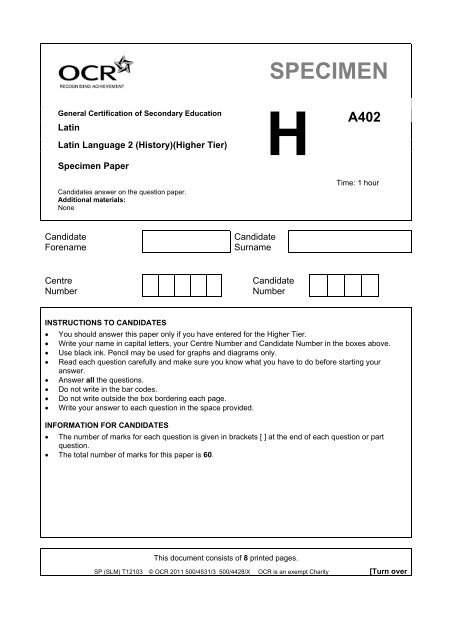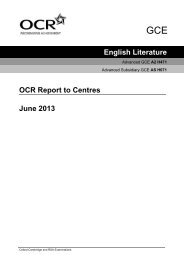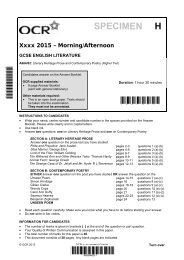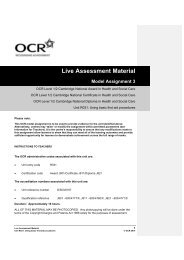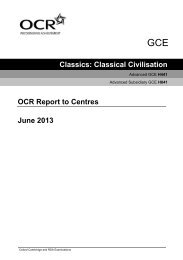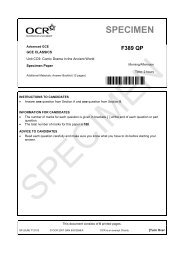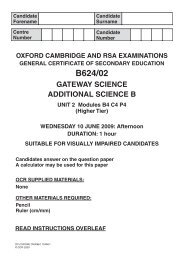specimen - OCR
specimen - OCR
specimen - OCR
Create successful ePaper yourself
Turn your PDF publications into a flip-book with our unique Google optimized e-Paper software.
SPECIMEN<br />
General Certification of Secondary Education<br />
Latin<br />
Latin Language 2 (History)(Higher Tier)<br />
Specimen Paper<br />
H<br />
Candidates answer on the question paper.<br />
Additional materials:<br />
None<br />
A402<br />
Time: 1 hour<br />
Candidate<br />
Forename<br />
Candidate<br />
Surname<br />
Centre<br />
Number<br />
Candidate<br />
Number<br />
INSTRUCTIONS TO CANDIDATES<br />
You should answer this paper only if you have entered for the Higher Tier.<br />
Write your name in capital letters, your Centre Number and Candidate Number in the boxes above.<br />
Use black ink. Pencil may be used for graphs and diagrams only.<br />
Read each question carefully and make sure you know what you have to do before starting your<br />
answer.<br />
Answer all the questions.<br />
Do not write in the bar codes.<br />
Do not write outside the box bordering each page.<br />
Write your answer to each question in the space provided.<br />
INFORMATION FOR CANDIDATES<br />
The number of marks for each question is given in brackets [ ] at the end of each question or part<br />
question.<br />
The total number of marks for this paper is 60.<br />
This document consists of 8 printed pages.<br />
SP (SLM) T12103 © <strong>OCR</strong> 2011 500/4531/3 500/4428/X <strong>OCR</strong> is an exempt Charity [Turn over
2<br />
Answer all the questions.<br />
Read the passage and answer the questions.<br />
The Spartan leader Pausanias was very successful but he was not trusted by his own citizens.<br />
When they learnt of his latest act of treachery, they called him back to the city to face charges.<br />
Pausanias erat dux audacissimus sed in omnibus rebus perfidus. Lacedaemonii, ubi<br />
cognoverunt eum consilia inimica contra patriam suam parare, imperaverunt ei ut Spartam<br />
rediret. Pausanias autem, dum urbi appropinquat, intellexit ex vultu civis cuiusdam, qui eum<br />
monere volebat, se in magnum periculum ductum esse. hoc cognito, in templum Minervae<br />
statim effugit. timebat enim ne a civibus puniretur; credebat se in sacro loco tutum manere<br />
posse.<br />
Names<br />
Pausanias, Pausaniae (m)<br />
Lacedaemonii, Lacedaemoniorum (m pl)<br />
Sparta, Spartae (f)<br />
Minerva, Minervae (f)<br />
Pausanias<br />
the Spartans<br />
Sparta (a city in Greece)<br />
Minerva (a goddess)<br />
Vocabulary<br />
perfidus, perfida, perfidum<br />
inimicus, inimica, inimicum<br />
tutus, tuta, tutum<br />
treacherous<br />
here = hostile<br />
safe
3<br />
1 Pausanias erat dux audacissimus sed in omnibus rebus perfidus (line 1): what does this<br />
sentence tell us about Pausanias?<br />
...........................................................................................................................................................<br />
...........................................................................................................................................................<br />
...........................................................................................................................................................<br />
.......................................................................................................................................................[4]<br />
2 Lacedaemonii, ubi cognoverunt eum consilia inimica contra patriam suam parare (lines 1-2):<br />
what did the Spartans discover about Pausanias?<br />
...........................................................................................................................................................<br />
.......................................................................................................................................................[2]<br />
3 imperaverunt ei ut Spartam rediret (lines 2-3): what did the Spartans do when they discovered<br />
this?<br />
...........................................................................................................................................................<br />
...........................................................................................................................................................<br />
.......................................................................................................................................................[3]<br />
4 Pausanias autem, dum urbi appropinquat, intellexit ex vultu civis cuiusdam, qui eum monere<br />
volebat, se in magnum periculum ductum esse (lines 3-4):<br />
(a) while he was approaching the city, what did Pausanias suddenly realise?<br />
...........................................................................................................................................................<br />
.......................................................................................................................................................[2]<br />
(b) how had he realised this?<br />
...........................................................................................................................................................<br />
...........................................................................................................................................................<br />
.......................................................................................................................................................[3]<br />
5 timebat enim ne a civibus puniretur; credebat se in sacro loco tutum manere posse (lines 5-6):<br />
explain fully why Pausanias ran into the temple of Minerva.<br />
...........................................................................................................................................................<br />
...........................................................................................................................................................<br />
...........................................................................................................................................................<br />
.......................................................................................................................................................[6]
4<br />
Read the rest of the story.<br />
The Spartans eventually found a way to cause Pausanias a slow death, with the surprising help<br />
of a member of his own family.<br />
tum magna turba civium ad templum convenit atque ianuam lapidibus obstruxit ne Pausanias<br />
exire posset. deinde tectum deleverunt quod sperabant eum sub caelo aperto celerius<br />
moriturum esse. ecce! inter eos erat etiam mater Pausaniae quae, postquam de scelere filii<br />
cognovit, perfidiam eius adeo detestabatur ut ipsa lapidem poneret ad filium claudendum.<br />
tandem Pausanias, e templo semianimis portatus, e vita discessit. eodem loco sepultus est ubi<br />
mortuus erat. tali modo dux clarissimus, qui saepe gentem suam ad victoriam duxerat, mortem<br />
miseram sine ulla dignitate passus est.<br />
Vocabulary<br />
lapis, lapidis (m)<br />
obstruo, obstruere, obstruxi, obstructus<br />
tectum, tecti (n)<br />
apertus, aperta, apertum<br />
perfidia, perfidiae (f)<br />
detestor, detestari, detestatus sum<br />
claudo, claudere, clausi, clausus<br />
semianimis, semianime<br />
sepelio, sepelire, sepelivi, sepultum<br />
dignitas, dignitatis (f)<br />
stone<br />
I block<br />
roof<br />
open<br />
treachery<br />
I disapprove of<br />
I shut in, imprison<br />
half-dead<br />
I bury<br />
dignity
5<br />
6 Translate the rest of the story into good English.<br />
...........................................................................................................................................................<br />
...........................................................................................................................................................<br />
...........................................................................................................................................................<br />
...........................................................................................................................................................<br />
...........................................................................................................................................................<br />
...........................................................................................................................................................<br />
...........................................................................................................................................................<br />
...........................................................................................................................................................<br />
...........................................................................................................................................................<br />
...........................................................................................................................................................<br />
...........................................................................................................................................................<br />
...........................................................................................................................................................<br />
...........................................................................................................................................................<br />
...........................................................................................................................................................<br />
...........................................................................................................................................................<br />
...........................................................................................................................................................<br />
...........................................................................................................................................................<br />
...........................................................................................................................................................<br />
...........................................................................................................................................................<br />
...........................................................................................................................................................<br />
...........................................................................................................................................................<br />
..................................................................................................................................................... [40]<br />
Paper Total [60]
6<br />
BLANK PAGE
7<br />
BLANK PAGE
8<br />
Copyright Acknowledgements:<br />
Permission to reproduce items where third-party owned material protected by copyright is included has been sought<br />
and cleared where possible. Every reasonable effort has been made by the publisher (<strong>OCR</strong>) to trace copyright<br />
holders, but if any items requiring clearance have unwittingly been included, the publisher will be pleased to make<br />
amends at the earliest opportunity.<br />
<strong>OCR</strong> is part of the Cambridge Assessment Group. Cambridge Assessment is the brand name of University of<br />
Cambridge Local Examinations Syndicate (UCLES), which is itself a department of the University of Cambridge.<br />
© <strong>OCR</strong> 2011
OXFORD CAMBRIDGE AND RSA EXAMINATIONS<br />
General Certificate of Secondary Education<br />
LATIN<br />
Unit A402: Latin Language 2 (History)<br />
(Higher Tier)<br />
Specimen Mark Scheme<br />
A402<br />
The maximum mark for this paper is 60.<br />
This document consists of 4 printed pages.<br />
SP (SLM) T12103 © <strong>OCR</strong> 2011 500/4531/3 500/4428/X <strong>OCR</strong> is an exempt Charity [Turn over
2<br />
Question<br />
Number<br />
Answer<br />
Max<br />
Mark<br />
1 Pausanias erat dux audacissimus sed in omnibus rebus<br />
perfidus (line 1): what does this sentence tell us about<br />
Pausanias? [4]<br />
he was a bold/very bold (1) leader (1) but treacherous (1) in<br />
everything (1)<br />
2 Lacedaemonii, ubi cognoverunt eum consilia inimica<br />
contra patriam suam parare (lines 1-2): what did the<br />
Spartans discover about Pausanias? [2]<br />
that was plotting (1) against his homeland (1)<br />
3 imperaverunt ei ut Spartam rediret (lines 2-3): what did the<br />
Spartans do when they discovered this? [3]<br />
they ordered him (1) to return (1) to Sparta (1)<br />
4 Pausanias autem, dum urbi appropinquat, intellexit ex<br />
vultu civis cuiusdam, qui eum monere volebat, se in<br />
magnum periculum ductum esse (lines 3-4):<br />
4(a) while he was approaching the city, what did Pausanias<br />
suddenly realise? [2]<br />
he had been brought (1) into danger (1)<br />
4(b) how had he realised this? [3]<br />
from the face/expression (1) of a friend (1) who wanted to warn<br />
him (1)<br />
5 timebat enim ne a civibus puniretur; credebat se in sacro<br />
loco tutum manere posse (lines 5-6): explain fully why<br />
Pausanias ran into the temple of Minerva. [6]<br />
he was afraid (1) that he would be punished (1) by the citizens<br />
(1)<br />
he hoped (1) he would be safe (1) if he stayed in the temple (1)
3<br />
Question<br />
Number<br />
Answer<br />
Max<br />
Mark<br />
6 Translate the rest of the story into good English. [40]<br />
1 tum magna turba civium ad templum convenit<br />
2 atque ianuam lapidibus obstruxit ne Pausanias exire<br />
posset.<br />
3 deinde tectum deleverunt quod sperabant eum sub caelo<br />
aperto celerius moriturum esse.<br />
4 ecce! inter eos erat etiam mater Pausaniae<br />
5 quae, postquam de scelere filii cognovit,<br />
6 perfidiam eius adeo detestabatur ut ipsa lapidem poneret<br />
ad filium claudendum.<br />
7 tandem Pausanias, e templo semianimis portatus, e vita<br />
discessit.<br />
8 eodem loco sepultus est ubi mortuus erat.<br />
9 tali modo dux clarissimus, qui saepe gentem suam ad<br />
victoriam duxerat,<br />
10 mortem miseram sine ulla dignitate passus est.<br />
The passage has been divided into 10 sections, of 4 marks<br />
each. Marks for each section should be awarded as follows.<br />
[4] Correct translation, with one minor error allowed<br />
[3] Overall sense clear, with two errors (which may include a<br />
major error) or three minor errors allowed<br />
[2] Part correct; but with overall sense lacking/unclear<br />
[1] No continuous sense correct; isolated knowledge of<br />
vocabulary only<br />
[0] Totally incorrect or omitted<br />
N.B. Consequential errors should not be penalised.<br />
A total mark for the passage (maximum 40) should be<br />
recorded.<br />
Paper Total [60]
4<br />
Assessment Objectives Grid<br />
Question AO1 Total<br />
1-6 60 60<br />
Totals 60 60


